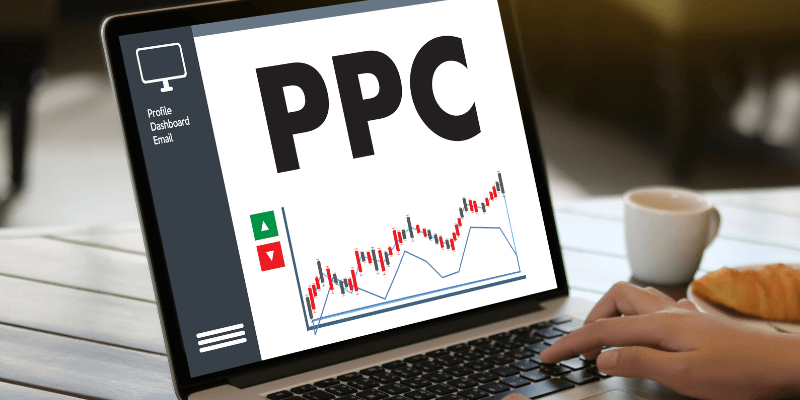If you’ve ever clicked on a Google ad or a sponsored post on social media, you’ve interacted with PPC marketing. Businesses use PPC (pay-per-click) advertising to drive targeted traffic to their websites, and skilled professionals are needed to manage and optimise these campaigns.
If you're looking to get into PPC, this guide will walk you through everything you need to know about this exciting career path, and why it’s a great idea to get into it.
What is PPC marketing?
The PPC meaning refers to a digital advertising model where advertisers pay a fee each time their ad is clicked. It’s a way of buying visits to a website rather than earning them organically. The most common form of PPC marketing is search engine advertising, where businesses bid for ad placement in search engine results. Rather than relying on traditional SEO methods that take time to build traction, PPC allows businesses to reach their target audience quickly and effectively.

What is PPC in digital marketing?
In digital marketing, PPC marketing is a crucial strategy that helps brands reach potential customers at the exact moment they are searching for related products or services. Platforms like Google Ads, Bing Ads, and social media advertising (Facebook, Instagram, LinkedIn) all use PPC to generate leads and conversions. These platforms offer various campaign types, including search ads, display ads, shopping ads, and remarketing ads, giving businesses multiple ways to engage potential customers.
How does PPC work?
If you’re wondering, “How does PPC work?”, the process is quite straightforward but requires strategic planning. Advertisers first research and select relevant keywords that potential customers might use when searching for their products or services. They then create compelling ad copy designed to attract clicks and conversions. Once the ad is launched, businesses enter a bidding system where they compete with other advertisers for prime ad placements.
The placement of an ad is determined by several factors, including bid amount, ad relevance, and landing page quality. Once a user clicks the ad, the advertiser is charged a fee, and the visitor is directed to a specific webpage. Advertisers continuously analyse their campaigns to optimise ad performance, ensuring they maximise returns on their advertising spend.
Why choose a career in PPC?
With so many specialisms to choose from in the marketing realm, it’s no wonder people looking to break into this industry are researching which avenue to go down. Let’s explore all the reasons why becoming a PPC specialist could be the right decision for you.
Is PPC a good career?
A career in PPC marketing is an excellent choice for those who enjoy a mix of creativity and data-driven strategy. The demand for PPC specialists continues to grow as businesses invest heavily in online advertising. PPC professionals have the opportunity to work in various industries, from e-commerce and finance to healthcare and technology. Additionally, this field offers rapid career progression, as companies are always looking for skilled professionals who can manage and optimise advertising budgets efficiently.
Are PPC specialists in demand?
With digital marketing spending increasing every year, PPC specialists are in high demand. Businesses understand that well-executed PPC campaigns can drive significant revenue, making experienced professionals highly valuable. Whether you choose to work for an agency, an in-house marketing team, or as a freelancer, there are numerous opportunities available in this field.

How much does a PPC specialist earn in UK?
PPC salaries in the UK vary based on experience and expertise. Entry-level PPC specialists can expect to earn between £25,000 and £35,000 per year, while those with a few years of experience can command salaries of £35,000 to £50,000 per year. Senior PPC managers or strategists may earn upwards of £70,000 per year, depending on the company and industry.
Additionally, freelance PPC consultants can charge hourly or project-based rates, often leading to even higher earnings potential.
Is there a future in PPC?
The future of PPC remains bright as digital advertising continues to evolve. Emerging trends such as automation, AI-driven bidding strategies, and voice search optimisation are shaping the landscape of PPC. While automation may handle certain aspects of campaign management, human expertise will always be necessary for crafting compelling ad strategies, analysing performance data, and making critical marketing decisions. As long as businesses seek online visibility and customer engagement, PPC will remain a vital component of digital marketing.
Do I need a degree for PPC?
Unlike many traditional careers, PPC does not require a university degree. While a marketing or business-related degree can be beneficial, many successful PPC specialists have built their careers through practical experience and professional certifications. Online courses, workshops, and industry-recognised qualifications (such as those from the Chartered Institute of Marketing - CIM) can provide the necessary knowledge and skills to succeed in this field.
Is learning PPC hard?
Learning PPC can be challenging at first, but it is entirely manageable with the right guidance and resources. PPC involves both analytical and creative skills, requiring professionals to understand data-driven decision-making while crafting engaging ad copy. Beginners may find the technical aspects, such as keyword research, bidding strategies, and conversion tracking, a bit overwhelming. However, with practice and the right training, anyone can become proficient in PPC marketing.
How to get into PPC with learndirect
If you’re ready to get into PPC, learndirect offers industry-recognised CIM qualifications to help you gain the necessary skills and knowledge. These online courses provide a flexible way to kick-start your PPC career, allowing you to study at your own pace while gaining practical insights from experienced professionals.
learndirect’s CIM courses for PPC careers
The CIM Foundation Certificate in Professional & Digital Marketing (Marketing Insights) Level 3 (RQF) is an ideal starting point for those new to digital marketing. It covers the purpose and function of marketing within organisations, the application of the marketing mix, the customer journey, and more. For those looking to focus more on digital channels, the CIM Foundation Certificate in Professional & Digital Marketing (Content & Channels) Level 3 (RQF) explores various advertising methods, including PPC campaigns.
For a broader understanding of marketing, the CIM Foundation Extended Certificate in Professional & Digital Marketing Level 3 (RQF) provides a comprehensive overview of both traditional and digital marketing approaches. Meanwhile, the CIM Certificate in Professional & Digital Marketing Level 4 (RQF) is suited for individuals looking to advance their marketing expertise and specialise in PPC campaign management at a higher level.
By enrolling in a CIM course with learndirect, you can gain the qualifications and knowledge necessary to stand out in the competitive PPC job market.
Start your PPC career
PPC advertising is a dynamic, fast-paced career that offers excellent growth opportunities and earning potential. If you are analytical, creative, and eager to work in the ever-evolving world of digital marketing, a career in PPC marketing could be perfect for you. With the right training and industry-recognised qualifications from learndirect, you can develop the skills needed to excel in this field.
Take the first step today and unlock a rewarding career in PPC. Click below to view our range on online CIM courses.



















